10 April 2012
Volcanology Etymology
Posted by Jessica Ball
In my liberal-arts-undergraduate life, I ended up taking a few linguistics classes to fulfill the requirements for my anthropology minor. I actually had a lot of fun, especially when we started talking about the etymology of words in modern English (otherwise known as, ‘stolen from everyone else’). Working out the component parts of a word is one of my favorite tricks for learning new vocab (I also play this game when I’m trying to deal with other languages, especially ones with a Latin base. It really works!)
So this weekend I started thinking about the specialized vocabulary that geologists use. Geology is fairly new as a science, and we’ve essentially cobbled together our own language to describe a lot of the things we study. But where do those words come from? Enter the Oxford English Dictionary, which is a fascinating place to spend a few free hours (or more). Not only will it define a word for you, it will give you a really thorough etymology of where that word came from, who used it, and when. So, courtesy of of the OED, here’s a tour through the origins of the volcanology vocabulary that I use all the time. The obvious place to start is, of course,
Volcano. This was predictable to anyone who knows their Roman mythology: Vulcan was the Roman god of fire and the forge (stolen from the Greek Hephaestus, who would have made a much worse name for a volcano. Can you imagine shouting “Look out! The Hephaestus is about to erupt”? Nope, neither can I. We’ll go with the Latin on this one.) There was also some suggestion that the Island of Vulcano (below) is where most other European languages picked up the term, although the earliest reference (Samuel Purchas’ Pilgrimage of 1613) seems to be to Hekla in Iceland.
Lava. Another Latin/Italian contribution. Lavare means to wash; lava was said to refer to ‘a streame or gutter suddainly caused by raine’ and applied in the Neapolitan dialect to an eruption of Vesuvius sometime in the 17th century. We can probably assume that someone saw a lava flow sweeping down the slopes of Vesuvius and ‘washing’ away everything in its path, and drew the connection.
Tephra. Pretty simple; tephra (τέϕρα) is Greek for ash or ashes (although I think it originally referred to ashes from a funeral pyre). Volcanologists have expanded it to include all of the air-transported particles that come out of a volcanic eruption.
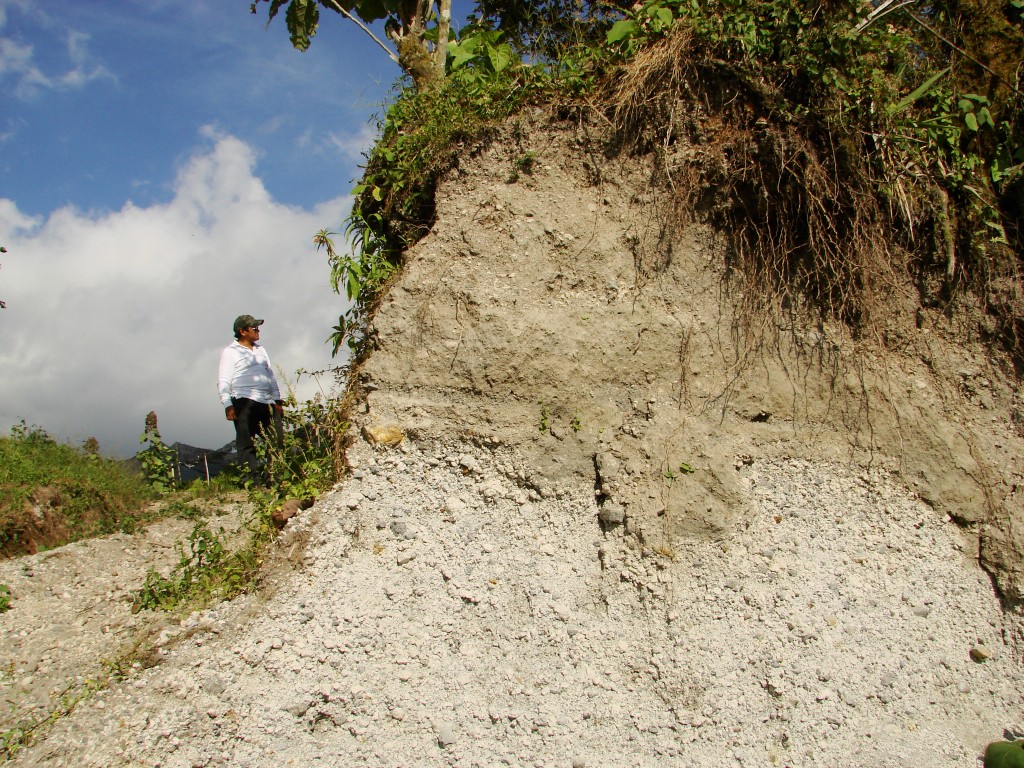
Tephra (ash, pumice, and lithics) deposited during the 1902 eruption of Santa Maria, Guatemala (the scale is a bit off here, but the outcrop is a couple of meters high)
Scoria. Latin for dross, but also Greek for dung. Dross makes more sense to me, since volcanic scoria does tend to resemble the slag that you get from refining ores (and the dross is what you have left behind after you’ve gotten all the good stuff out).
Caldera. There are a lot of languages with similar words (Spanish is caldera, Portuguese caldeira, and French is chaudière), but they all refer to a cauldron or kettle. Those languages, of course, stole it from the Latin caldaria (s. caldarium), which referred to a Roman hot bath or bathing room. Which makes sense overall; calderas can certainly be hot, steamy places, and the shape is similar to a large bowl or cauldron. A bit of the oldest and new origins, perhaps.
Ignimbrite. Ign- is a Latin prefix referring to fire, and imbr-is or imber is a shower of rain or a stormcloud. So the etymology implies a process: a rain of fire produced this rock. Bingo! Ignimbrites form during large explosive eruptions, generally from pyroclastic density currents (which are composed of very hot things), so this could definitely look like a rain of fire, at least at night.
Tuff. This one is a bit tricky, because it’s got Italian origins, but the Italians also used the word tufo (and the French tufa) to describe a soft or easily crumbling building stone. We now use tufa when referring to a carbonate rock and tuff when referring to a volcanic one, but they’ve apparently both got Italian (and hence Latin) roots. The Latin is tofus or tophus, a general name for loose porous stones of various kinds.
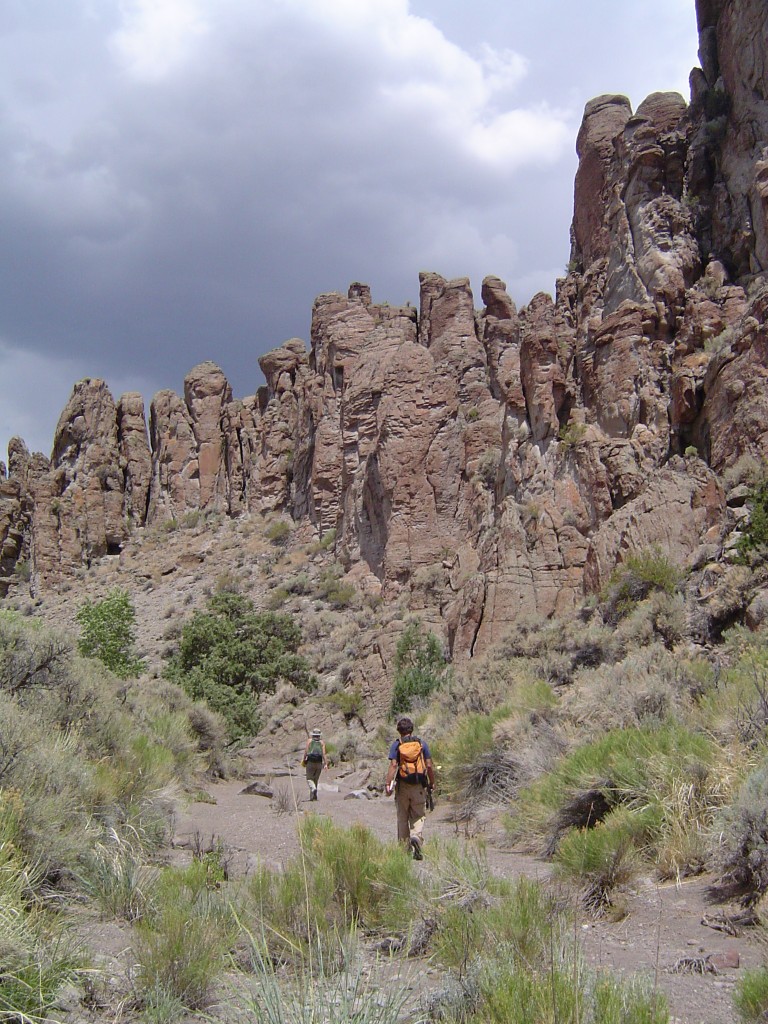
Hiking by outcrops of the Osiris trachyte, a welded ash-flow tuff on the Fish Lake Plateau, Utah, 2006
I’m thinking the next post will have to be on minerals, since I happened to look up plagioclase and sanidine and boy, do those names make more sense now! (That’s another great thing about learning the etymology of a word – the really good compound words have meanings that usually describe something pretty distinctive about what they’re naming. For me, this makes the word a lot easier to remember…and who couldn’t use help memorizing mineral names once in a while?)


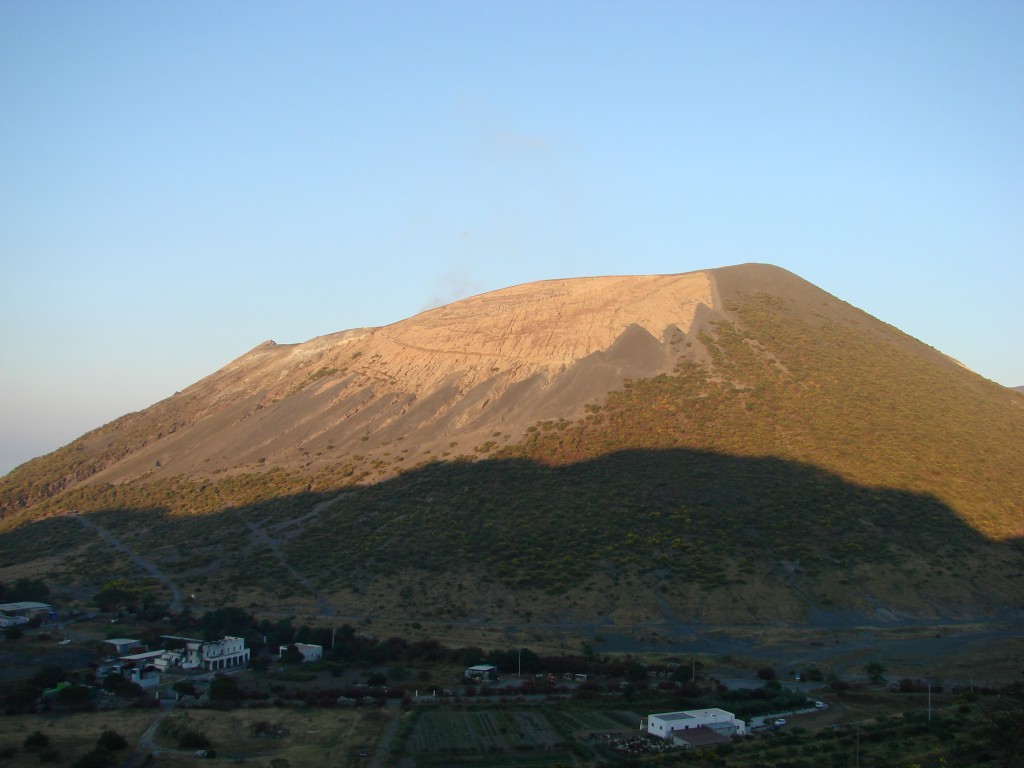
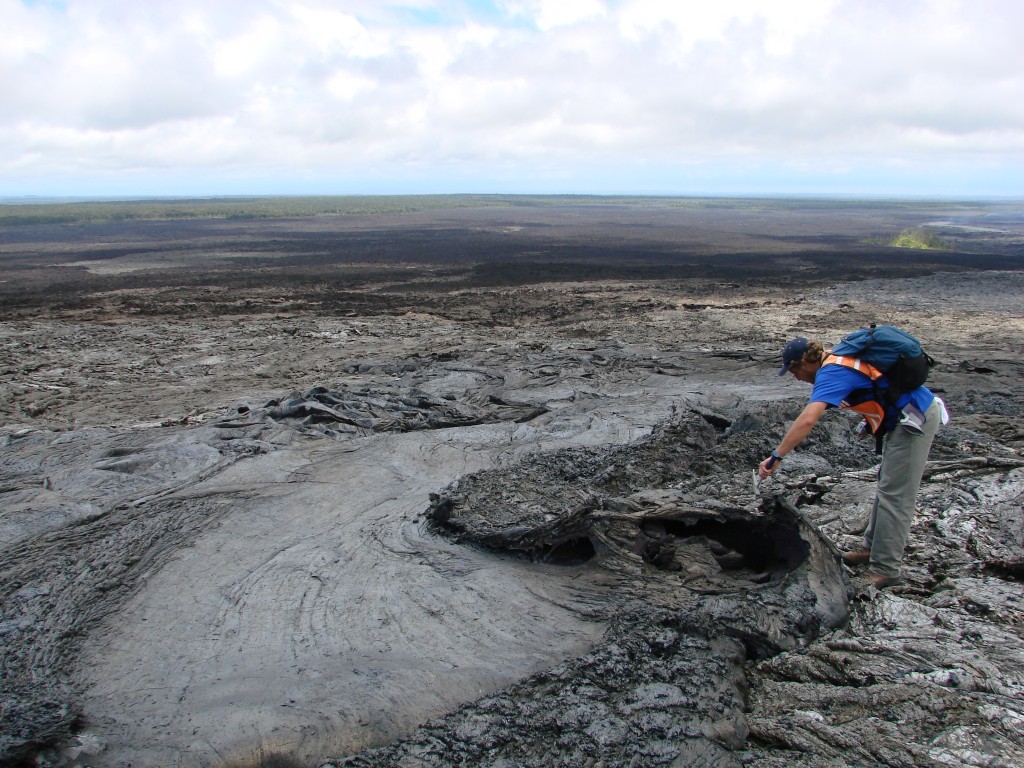
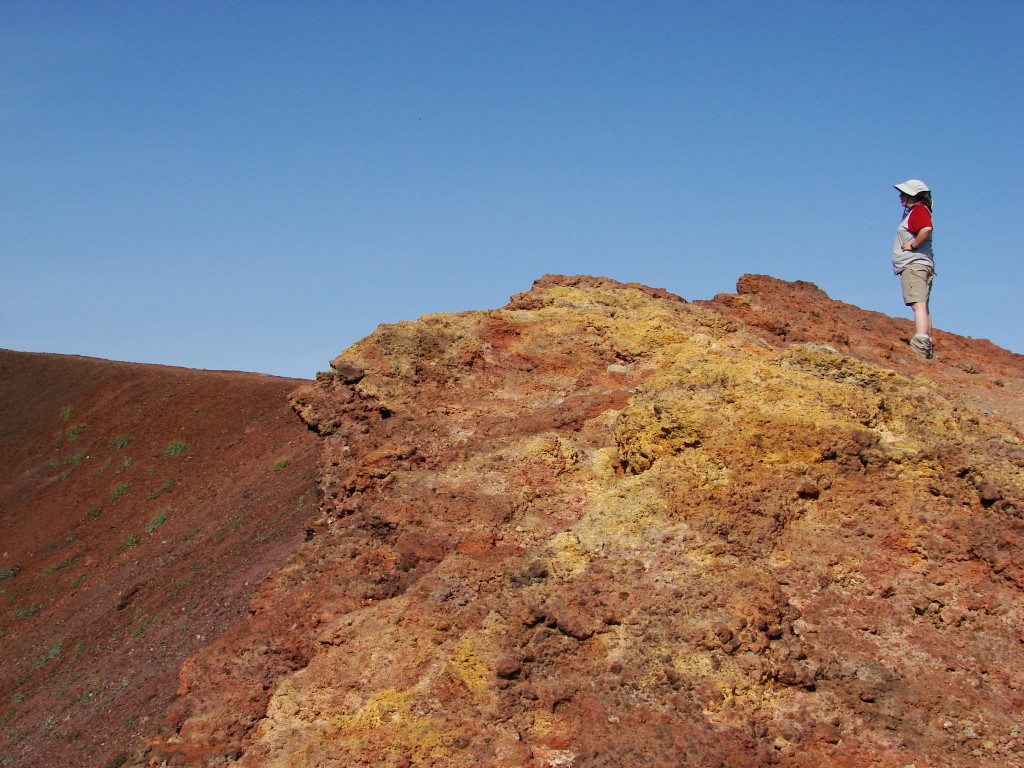
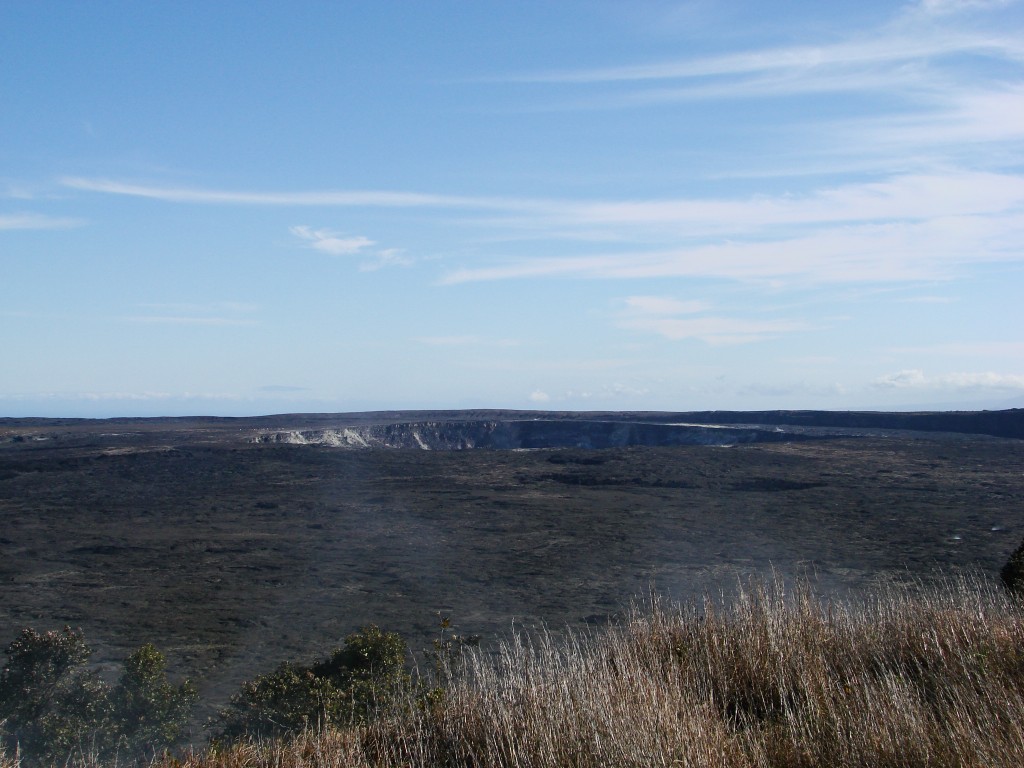
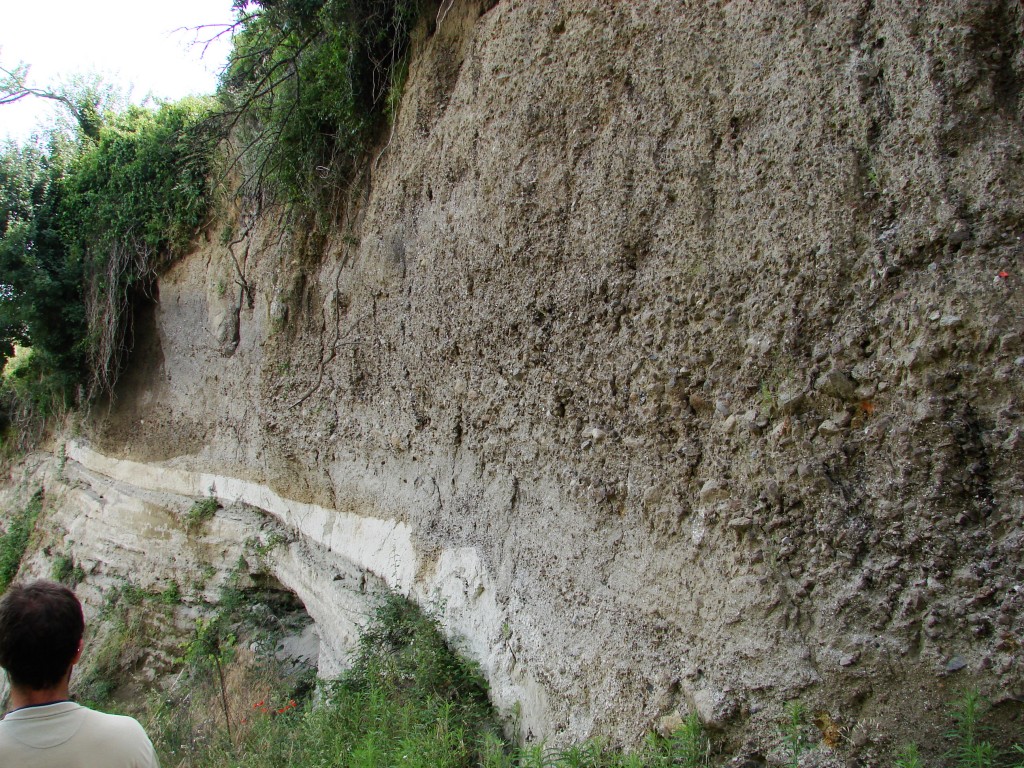
 Jessica Ball is a volcanologist at the U.S. Geological Survey, researching volcanic hydrothermal systems and stability, and doing science communication for the California Volcano Observatory. She previously worked at the Geological Society of America's Washington DC Policy Office, learning about the intersection of Earth science and legislative affairs. Her Mendenhall postdoc and PhD focused on how water affects the stability of volcanoes, and involved both field investigations and numerical modeling applications. Her blogging covers a range of topics, from her experiences in academic geosciences to science outreach and communication to her field and lab work in volcanology.
Jessica Ball is a volcanologist at the U.S. Geological Survey, researching volcanic hydrothermal systems and stability, and doing science communication for the California Volcano Observatory. She previously worked at the Geological Society of America's Washington DC Policy Office, learning about the intersection of Earth science and legislative affairs. Her Mendenhall postdoc and PhD focused on how water affects the stability of volcanoes, and involved both field investigations and numerical modeling applications. Her blogging covers a range of topics, from her experiences in academic geosciences to science outreach and communication to her field and lab work in volcanology.
Great post! I teach introductory geology at a community college in California, and I’ve always enjoyed learning about the etymology of geological terms.
Here’s an etymological challenge for you (or anyone) – it’s a hard one! People used to called felsic rocks and mafic rocks by different names. They were called `acid’ rocks and `basic’ rocks. What in the world did they mean by that?
I’ve tried like crazy to find out, but haven’t had much luck so far. I had hoped that Davis Young’s `Mind Over Magma’ would have the answer, but I don’t think it does, quite.
Somehow the silica-rich rocks were referred to as `acid’, and the silica-poor rocks were referred to as `basic’. How did that come about? Was it related to the way rocks got analyzed in terms of oxides? (And where did *that* practice come from? Some laboratory necessity?) Is silica acidic, under some definition of acids and bases?
Plenty of old (and not-so-old) books use the terms `acid’ and `basic’ for igneous rocks, but I’ll be darned if I can find the original definitions!
(I suspect that Bunsen may have even had something to do with this…)
The first reference that OED gives is from M. J. Durocher’s 1857 Essay on Comparative Petrology, where he says:
So I guess this might be the first instance – and it does have something to do with the oxides. Beats me how they did the original analyses; I’m guessing a lot of wet chemistry was involved.
Very nice, some of the words i had no clue about, and I love the replies!
Absolutely loved this. I’m also a big fan of tracing the routes of words in general, and especially the Earth Science ones. Hope to see some more of these etymology posts!!! 😀
Agreed! Loved the post….and I also love etymology. I make my high school and college students learn their “roots”! They’ve found that it helps them in all of their science courses, in English vocabulary and on the ACT as well. WIN!
I do not have formal training in geology, but reading about it is one of my hobbies—-along with writing poetry and appreciating architecture. Since I have some word-origin training from studying Spanish, French and Latin decades ago, I really loved your blog and can hardly wait for more!
Excellent post.
The high resolution photos are helpful.
I will direct my English professor friends to this, too.
Thank you.
Enjoyed the etymology of volcanic terms, could I add lahar a Malaysian word for mudflow?
[…] 7) Pequeno dicionário fabuloso da etimologia dos termos usados em vulcanologia. […]
[…] Volcanology Etymology – Magma Cum Laude – AGU Blogosphere. […]